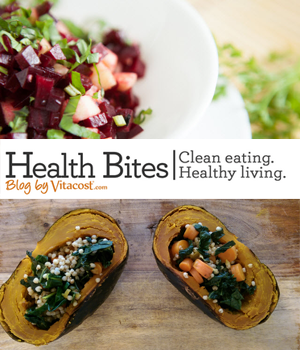Gluten-Free Gluttony
There is so much buzz about gluten free these days. And now many gluten intolerant and people with celiac disease can rejoice in the many wonderful and tasty gluten free options. I have another amazing guest post from Vitacost.com to share their gluten free options at low cost. Thanks again Vitacost!!
Eating without gluten may be easier today than ever before. Bakeries are specializing in gluten-free treats, concession stands are selling gluten-free beer and merchants are stocking a variety of gluten-free foods. Sweet and savory treats are no longer taboo for gluten-intolerant folks—go ahead, have your cake and eat it, too! (Health Coach interjection – all in moderation ![]() )
)
Put pasta back on your plate – Gluten comes from a protein in wheat kernel. Traditionally, pasta is made with durum wheat flour or durum semolina (a.k.a. wheat). With the increasing prominence of gluten intolerance, companies are concocting faux pasta by replacing wheat with rice. Rice pasta looks the same, smells the same, tastes the same and generally cooks the same as regular pasta. Looking for whole grain pasta without the gluten? Try tossing brown rice pasta shells with your favorite organic dressing for a quick, tasty pasta salad.
It’s your party. Eat cake if you want to – Again, the wheat flour in most sweet sensations – cookies, cakes, pies – spoils any good birthday or wedding when you have celiac disease or a gluten intolerance. With the selection of cookies and cake mixes today, you finally have something sweet to celebrate. If you don’t want to make your own gluten-free dessert, look for a local bakery to satisfy your dietary and sweet tooth needs. At your next party, BYOD (Bring Your Own dessert) so you can indulge, too – sharing optional.
Cheers to beer – Wines are naturally free of gluten, so gluten-free sots will sip wine as a safe bet. (Warning: some vineyards add gluten to preserve freshness.) But what about having a beer while watching the game? Drive (sober) to the nearest liquor, or specialty wine, store for a variety of gluten-free beer brands. When you’re watching the game live, research the stadium before you go. Many ballparks feature concession stands dedicated to gluten-free fare, which might be just the ticket!
This article has been provided by the folks at Vitacost.com. Vitacost.com has been selling discount vitamins such as vitamin D, Vitamin B12 and Vitamin C since 1994. Since then it’s grown into one of the biggest online marketplaces for healthy living essentials-with vitamins and supplements being just one of their many helpful categories! Get the best price on vitamins, nutritional supplements, whole foods and diet products.
Vitacost.com’s customers mean the world to them, and it’s their goal to provide you with the best nutritional supplements, natural foods and sports nutrition to help with your health and wellness. Vitacost.com is not affiliated with this blog, and isn’t responsible for content outside of this article.
By: +Elizabeth Lotts writer for Vitacost.com
A few gluten free recipes from Pam Higgins:
https://www.totalhealthcounseling.com/2012/coconut-curry-chicken/
https://www.totalhealthcounseling.com/2012/pumpkin-seeds-butter/
https://www.totalhealthcounseling.com/2011/turkey-thighs-in-the-crockpot/
https://www.totalhealthcounseling.com/2011/sweet-potato-and-black-bean-stew/


